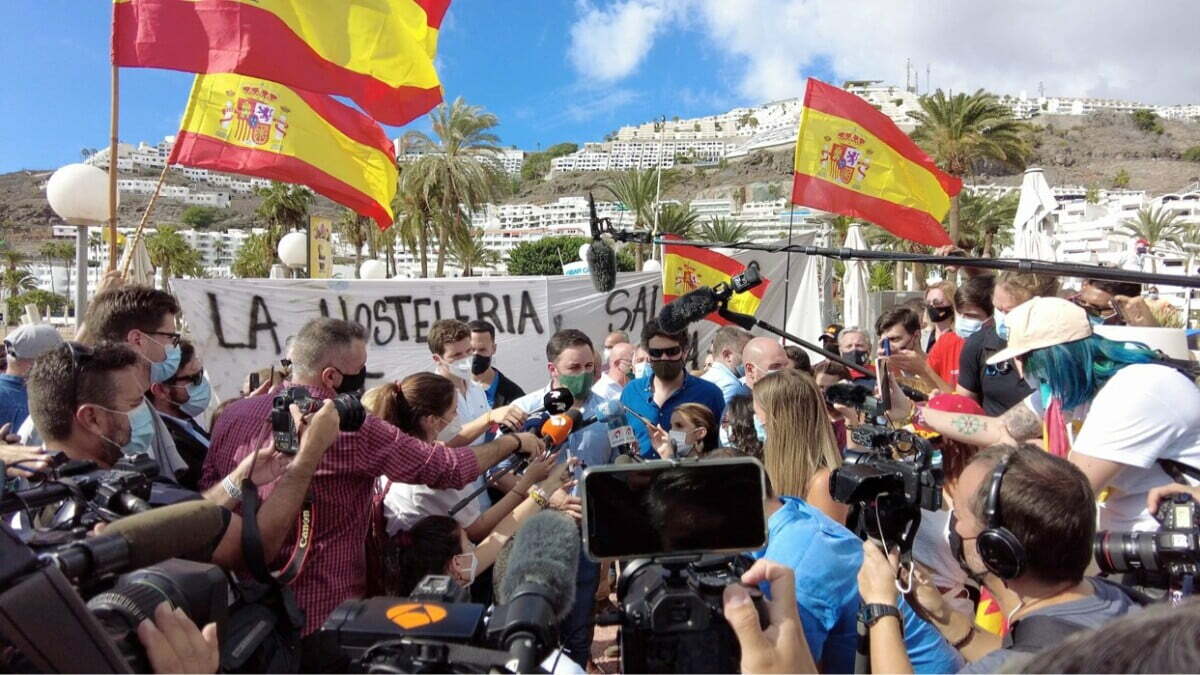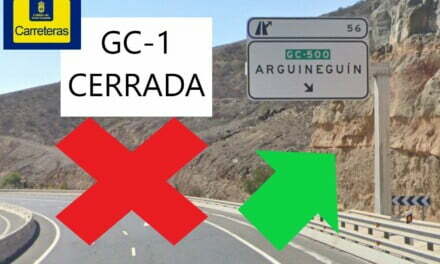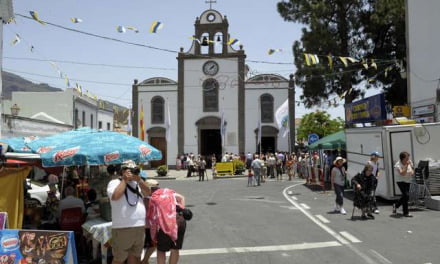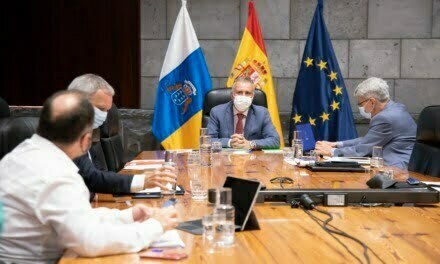 Editor-in-Chief – Edward Timon .:.
Editor-in-Chief – Edward Timon .:.
Spain has come a long way over the last 45 years and since it became a “Social Democracy” with the 1978 passing of the Spanish Constitution, being celebrated across Spain this weekend, during the 6th of December Constitution Day holiday culminating on Sunday. Almost all Spanish political parties celebrate the country’s transition away from the ultra right wing dictatorship under which it spent four dark decades. Though Spain’s far-right vox party confess mixed feelings. The party itself was formed by groups of conservative politicians who splintered from existing parties including the Partido Popular (PP) and ultra-right-wing Falangist parties that were the legacy of Francoist Spain. Now a protest in the holiday resort of Puerto Rico de Gran Canaria risks helping to increase tensions and add to the rise of the far-right from the ghostly ashes of what was thought to be Spain’s long dead fascist fervour.
The vox party has seen a significant increase in support since their founding in 2013, and although they struggled to find votes at first, in the last general election they managed to gain 10% of the votes cast nationally, becoming the third largest party in the country, and have a majority in Andalucia and a significant following in several areas of the country. They define themselves as anti-feminist, anti-islam and anti-immigration upholding what they call traditional Spanish catholic family values, and an unwavering allegiance to military institutions and members of the security forces, within whose ranks they hold some influence.
 Their propaganda has found resonance among conservative and rural populations based mainly on fear generated by an increase in migration across the mediterranean over recent years, and this year has been fuelled by the massive increase in irregular migrants arriving on The Canary Islands throughout 2020. Some questionable local politicians here in the archipelago have also sought to capitalise on local frustrations, to further their own profiles, by appealing to protectionist ideals and by feeding the fears of ordinary people who feel excluded by the policies of Spain’s left-wing coalition Government led by the socialist PSOE party and Podemos. It has certainly led to an increase in far-right anti-immigrant rhetoric within the social discourse of The Canary Islands. Vox are a particular style of political party, claiming to represent the Spanish people, while consistently using hatred and division as a method to grab attention. Far from simply being unruly, there are many sinister questions over who they really are, what they really want to achieve and who exactly is behind them.
Their propaganda has found resonance among conservative and rural populations based mainly on fear generated by an increase in migration across the mediterranean over recent years, and this year has been fuelled by the massive increase in irregular migrants arriving on The Canary Islands throughout 2020. Some questionable local politicians here in the archipelago have also sought to capitalise on local frustrations, to further their own profiles, by appealing to protectionist ideals and by feeding the fears of ordinary people who feel excluded by the policies of Spain’s left-wing coalition Government led by the socialist PSOE party and Podemos. It has certainly led to an increase in far-right anti-immigrant rhetoric within the social discourse of The Canary Islands. Vox are a particular style of political party, claiming to represent the Spanish people, while consistently using hatred and division as a method to grab attention. Far from simply being unruly, there are many sinister questions over who they really are, what they really want to achieve and who exactly is behind them.
Is there a link between US military support for an Iranian militia and their ability to leverage a huge donation to found far-right vox party in Spain?
Most people, even among their supporters, have little or no idea as to how the vox party was initially funded. Almost all of the €972,000 collected to form the party came from the members of an organisation that, at first glance, seems incongruous with the beliefs espoused by the party itself. Practically all of money raised to create vox came from one unlikely source, known as the MEK (Mojahedin-e-Khalq), The Islamic Liberation Army of the People’s Mujahedin of Iran.
The MEK were themselves formed in the 70s by islamic marxist revolutionaries fighting against the British backed monarchical dictatorship led by Shah Mohammad Reza Pahlavi, who, in 1953, had overthrown the democratically elected government of Iran. They quickly then became one of the main centres of opposition to the the Islamic Republic of Iran and the leader of the 1979 Iranian Revolution, Ayatollah Khomeini, who achieved the overthrow of the last Shah of Iran, and put an end to the 2,500-year-old Persian monarchy
Exiled from Iran, the MEK were then funded for two decades, with near limitless resources, by the Iraqi dictator Saddam Hussein, earning them a listing by the US and United Nations as a dangerous terrorist organisation. Following the Iraq conflict starting in 2003, which led to Hussein’s downfall, the MEK were taken into protection by the US military, in places like Fallujah, where they were seen as intelligence assets in understanding and opposing the Iranian regime. When the newly installed Iraqi government refused to allow them to continue there, even though the group had been by then removed from designated terrorist watchlists, the US, along with several high profile European politicians, saw them as an alternative Iranian government in exile, and persuaded the group to leave Iraq. In 2013 they moved the more than 3,000 core members of the MEK to Albania, with the help of a $20 million donation to the UN Refugee Fund to help them resettle. The camp that the MEK now inhabit near Tirana was revealed, in 2018, to be less to do with refugees and more akin to a secretive military camp, constructed by the US military, from which the group’s worldwide operations are coordinated. And it was from here that MEK members across Europe and the world were instructed to send money for the formation of vox in Spain, who gathered nearly €1 million to create the party which stands staunchly against what they fear as the islamification of Europe. Is there a link between US military support for the MEK and their ability to leverage a huge donation to found this new far-right party in Spain?
It has also been widely reported that the MEK has collaborated with Israel’s Mossad, including in attacks against Iranian nuclear scientists, according to U.S. officials. The MEK has called the allegations of their role in assassinating Iranian nuclear scientists “patently false.” Though there may again be those asking questions following the recent assassination of one such prominent scientist in the last week.
The controversial funding for vox was through many smaller transfers coming from individual supporters of the MEK in various countries, many think in gratitude to Conservative Spanish politician Alejo Vidal-Quadras, for many years an MEP and advocate for the MEK. Vidal-Quadras went on to become one of the founding members of vox attracting the support of ultra-nationalist conservatives to create a party focused on their fear of an “Islamist invasion” that was the “enemy of Europe.”
Despite having openly criticised Spain’s regional political system, lobbying instead for centralised control from Madrid, and having stood fervently against state funding for serving representatives elected to government, the success that vox has recently achieved has meant that now nearly €3 million of Spanish government money is being used to finance its activities in Andalucia and across Spain. Vox party leader Santiago Abascal himself is alleged to have drawn his own wages, along with others in the party, directly from the MEK startup fund.
That the party want to disempower regional governments has, up until this year, often been seen as an obstacle to their gaining any real support here in The Canary Islands, but this year’s atrocious handling of a sudden yet predicted increase in migrant arrivals has it seems given the party a foothold, where social media networks have been used to great effect to spread misinformation and patently false claims that feed on the fears of a population already reeling from massive unemployment and great uncertainty in the face of a global pandemic that has reduced the primary economic activity of tourism to the islands almost to zero.
The rise of far-right politics on Gran Canaria
The local mayor of Mogán, whose town hall administers several of the more popular tourist resort areas of Gran Canaria, has claimed in the media that she cares for the rights of migrants, yet repeatedly marched alongside vox activists and supporters. Many see this simply as a vain attempt to garner a more national profile, and harvest feelings of unrest among a population whose poverty and social needs too often go unaddressed, all while large urban projects are green lighted that benefit big investors, and large contractors, but seem to do little to support employment locally. That she herself was arrested, again, in September under investigation, again, for alleged electoral fraud has not been lost on observers who fear that she and her right-leaning CIUCA party, itself an offshoot of the PP, may simply be making a lot of noise about the migrant crisis as a method of distracting attention from their own alleged criminality.

Santiago Abascal, of the Vox party, at a campaign rally in Granada Photo: Picture-alliance/dpa/A.Camara
Now vox’s leader Santiago Abascal has decided to visit The Canary Islands and his party plan, this Friday, once more to join a locally organised protest in Puerto Rico, ostensibly to “Save Tourism”, after some of the migrant arrivals that had built up, in a makeshift camp in the port of Arguineguín over the last few months, were temporarily accommodated in hotels and apartments, primarily left empty due to coronavirus restrictions having reduced tourism this year to nearly zero. The organisers say they are apolitical and only want to ensure a recovery for tourism in the area, however also have called for the immediate removal of migrants from tourist accommodation, saying it harms the image of the destination.
 Cara al Sol, the name of vox’s official anthem, was supposedly written by none other than the executed leader of Falange, José Antonio Primo de Rivera, whose fascist military coup led to the Spanish Civil War and the installing of the brutal dictator Franco who ruled spain for four decades, before he himself died in 1975, leaving the country in disarray following two generations of regressionist policies. After so much progress and progressive change to civil society in Spain, how can it be that these views are once again rising on the streets and in the already complicated politics of this still-young democracy?
Cara al Sol, the name of vox’s official anthem, was supposedly written by none other than the executed leader of Falange, José Antonio Primo de Rivera, whose fascist military coup led to the Spanish Civil War and the installing of the brutal dictator Franco who ruled spain for four decades, before he himself died in 1975, leaving the country in disarray following two generations of regressionist policies. After so much progress and progressive change to civil society in Spain, how can it be that these views are once again rising on the streets and in the already complicated politics of this still-young democracy?
Today these fascists are responding to the dog whistle of disquiet in this peripheral region of Europe on the southernmost frontier of Spain and have decided to loudly use the crisis to promote ever more tension. What was a tranquil sunny outpost is fast becoming a crucible for what could be one of the most important struggles of our time for the hearts and minds of ordinary Spaniards suffering from a global economic crash brought on by a pandemic for which no-one was properly prepared. The consequences of the rhetoric behind much of this protest in Puerto Rico may last far longer than even the effects of the global pandemic having wrought havoc to a tourism reliant economy.

















